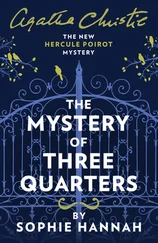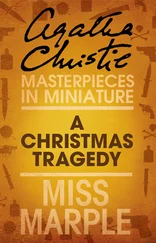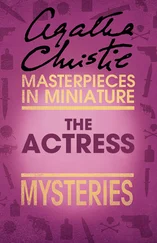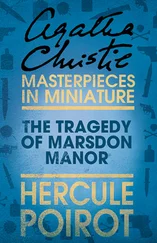Agatha Christie - Three Act Tragedy
Здесь есть возможность читать онлайн «Agatha Christie - Three Act Tragedy» весь текст электронной книги совершенно бесплатно (целиком полную версию без сокращений). В некоторых случаях можно слушать аудио, скачать через торрент в формате fb2 и присутствует краткое содержание. Жанр: Классический детектив, на английском языке. Описание произведения, (предисловие) а так же отзывы посетителей доступны на портале библиотеки ЛибКат.
- Название:Three Act Tragedy
- Автор:
- Жанр:
- Год:неизвестен
- ISBN:нет данных
- Рейтинг книги:4.5 / 5. Голосов: 2
-
Избранное:Добавить в избранное
- Отзывы:
-
Ваша оценка:
- 100
- 1
- 2
- 3
- 4
- 5
Three Act Tragedy: краткое содержание, описание и аннотация
Предлагаем к чтению аннотацию, описание, краткое содержание или предисловие (зависит от того, что написал сам автор книги «Three Act Tragedy»). Если вы не нашли необходимую информацию о книге — напишите в комментариях, мы постараемся отыскать её.
Three Act Tragedy — читать онлайн бесплатно полную книгу (весь текст) целиком
Ниже представлен текст книги, разбитый по страницам. Система сохранения места последней прочитанной страницы, позволяет с удобством читать онлайн бесплатно книгу «Three Act Tragedy», без необходимости каждый раз заново искать на чём Вы остановились. Поставьте закладку, и сможете в любой момент перейти на страницу, на которой закончили чтение.
Интервал:
Закладка:
“When I joined you at Crow’s Nest you already had a list drawn up of the people who had been at Crow's Nest and at Melfort Abbey. I may say now that the four names which headed the list – Captain and Mrs. Dacres, Miss Sutcliffe and Miss Wills – I discarded immediately.
“It was impossible that any of those four people should have known beforehand that they were going to meet Stephen Babbington at dinner. The employment of nicotine as a poison showed a carefully thought-out plan, not one that could be put into operation on the spur of the moment. There were three other names on that list – Lady Mary Lytton Gore, Miss Lytton Gore and Mr. Oliver Manders. Although not probable, those three were possible . They were local people, they might conceivably have motives for the removal of Stephen Babbington, and have chosen the evening of the dinner-party for putting their plans into operation.
“On the other hand, I could find no evidence whatsoever that any of them had actually done such a thing.
“Mr. Satterthwaite, I think, reasoned on much the same lines as I had done, and he fixed his suspicion on Oliver Manders. I may say that young Manders was by far the most possible suspect. He displayed all the signs of high nervous tension on that evening at Crow’s Nest – he had a somewhat distorted view of life owing to his private troubles – he had a strong inferiority complex, which is a frequent cause of crime, he was at an unbalanced age, he had actually had a quarrel, or shall we say had displayed animosity against Mr. Babbington. Then there were the curious circumstances of his arrival at Melfort Abbey. And later we had his somewhat incredible story of the letter from Sir Bartholomew Strange and the evidence of Miss Wills as to his having a newspaper cutting on the subject of nicotine poisoning in his possession.
“Oliver Manders, then, was clearly the person who should be placed at the head of the list of those seven suspects.
“But then, my friends, I was visited by a curious sensation. It seemed clear and logical enough that the person who had committed the crimes must have been a person who had been present on both occasions; in other words a person on that list of seven – but I had the feeling that that obviousness was an arranged obviousness. It was what any sane and logical person would be expected to think. I felt that I was, in fact, looking not at reality but at an artfully painted bit of scenery. A really clever criminal would have realised that anyone whose name was on that list would necessarily be suspect , and therefore he or she would arrange for it not to be there.
“In other words, the murderer of Stephen Babbington and Sir Bartholomew Strange was present on both occasions – but was not apparently so.
“Who had been present on the first occasion and not on the second? Sir Charles Cartwright, Mr. Satterthwaite, Miss Milray and Mrs. Babbington.
“Could any of those four have been present on the second occasion in some capacity other than their own? Sir Charles and Mr. Satterthwaite had been in the South of France, Miss Milray had been in London, Mrs. Babbington had been in Loomouth. Of the four, then, Miss Milray and Mrs. Babbington seemed indicated. But could Miss Milray have been present at Melfort Abbey unrecognised by any of the company? Miss Milray has very striking features not easily disguised and not easily forgotten. I decided that it was impossible that Miss Milray could have been at Melfort Abbey unrecognised. The same applied to Mrs. Babbington.
“For the matter of that could Mr. Satterthwaite or Sir Charles Cartwright have been at Melfort Abbey and not been recognised? Mr. Satterthwaite just possibly; but when we come to Sir Charles Cartwright we come to a very different matter. Sir Charles is an actor accustomed to playing a part. But what part could he have played?
“And then I came to the consideration of the butler Ellis.
“A very mysterious person, Ellis. A person who appears from nowhere a fortnight before the crime and vanishes afterwards with complete success. Why was Ellis so successful? Because Ellis did not really exist. Ellis, again, was a thing of pasteboard and paint and stagecraft – Ellis was not real.
“But was it possible ? After all, the servants at Melfort Abbey knew Sir Charles Cartwright, and Sir Bartholomew Strange was an intimate friend of his. The servants I got over easily enough. The impersonation of the butler risked nothing – if the servants recognised him – why, no harm would be done – the whole thing could be passed off as a joke. If, on the other hand, a fortnight passed without any suspicion being aroused, well, the thing was safe as houses. And I recalled what I had been told of the servants’ remarks about the butler. He was ‘quite the gentleman,’ and had been ‘in good houses,’ and knew several interesting scandals. That was easy enough. But a very significant statement was made by the parlourmaid Alice. She said, ‘He arranged the work different from any butler I ever knew before.’ When that remark was repeated to me, it became a confirmation of my theory.
“But Sir Bartholomew Strange was another matter. It is hardly to be supposed that his friend could take him in. he must have known of the impersonation. Had we any evidence of that? Yes. The acute Mr. Satterthwaite pounced on one point quite early in the proceedings – the facetious remark of Sir Bartholomew (totally uncharacteristic of his manner to servants) – ‘You’re a first-class butler, aren’t you Ellis?’ A perfectly understandable remark if the butler were Sir Charles Cartwright and Sir Bartholomew was in on the joke.
“Because that is undoubtedly how Sir Bartholomew saw the matter. The impersonation of Ellis was a joke, possibly even a wager, its culmination was designed to be the successful spoofing of the house party – hence Sir Bartholomew’s remark about a surprise and his cheerful humour. Note, too, that there was still time to draw back. If any of the house party had spotted Charles Cartwright that first evening at the dinner table, nothing irrevocable had yet occurred. The whole thing could have been passed off as a joke. But nobody noticed the stooping middle-aged butler, with his belladonna-darkened eyes, and his whiskers, and the painted birthmark on his wrist. A very subtle identifying touch that – which completely failed, owing to the lack of observation of most human beings! The birthmark was intended to bulk largely in the description of Ellis – and in all that fortnight no one noticed it! The only person who did was the sharp-eyed Miss Wills, to whom we shall come presently.
“What happened next? Sir Bartholomew died. His time the death was not put down to natural causes. The police came. They questioned Ellis and the others. Later that night ‘Ellis’ left by the secret passage, resumed his own personality, and two days later was strolling about the gardens at Monte Carlo ready to be shocked and surprised by the news of his friend’s death.
“This, mind you, was all theory. I had no actual proof, but everything that arose supported that theory. My house of cards was well and truly built. The blackmailing letters discovered in Ellis’s room? But it was Sir Charles himself who discovered them!
“And what of the supposed letter from Sir Bartholomew Strange asking young Manders to arrange an accident? Well, what could be easier than for Sir Charles to write that letter in Sir Bartholomew’s name? If Manders had not destroyed that letter himself, Sir Charles in the role of Ellis can easily do so when he valets the young gentleman. In the same way the newspaper cutting is easily introduced by Ellis into Oliver Manders’s wallet.
“And now we come to the third victim – Mrs. de Rushbridger. When do we first hear of Mrs. de Rushbridger? Immediately after that very awkward chaffing reference to Ellis being the perfect butler – that extremely uncharacteristic utterance of Sir Bartholomew Strange. At all costs attention must be drawn away from Sir Bartholomew’s manner to his butler. Sir Charles quickly asks what was the message the butler had brought. It is about this woman – this patient of the doctor’s. And immediately Sir Charles throws all his personality into directing attention to this unknown woman and away from the butler. He goes to the Sanatorium and questions the Matron. He runs Mrs. de Rushbridger for all he is worth as a red herring.
Читать дальшеИнтервал:
Закладка:
Похожие книги на «Three Act Tragedy»
Представляем Вашему вниманию похожие книги на «Three Act Tragedy» списком для выбора. Мы отобрали схожую по названию и смыслу литературу в надежде предоставить читателям больше вариантов отыскать новые, интересные, ещё непрочитанные произведения.
Обсуждение, отзывы о книге «Three Act Tragedy» и просто собственные мнения читателей. Оставьте ваши комментарии, напишите, что Вы думаете о произведении, его смысле или главных героях. Укажите что конкретно понравилось, а что нет, и почему Вы так считаете.












